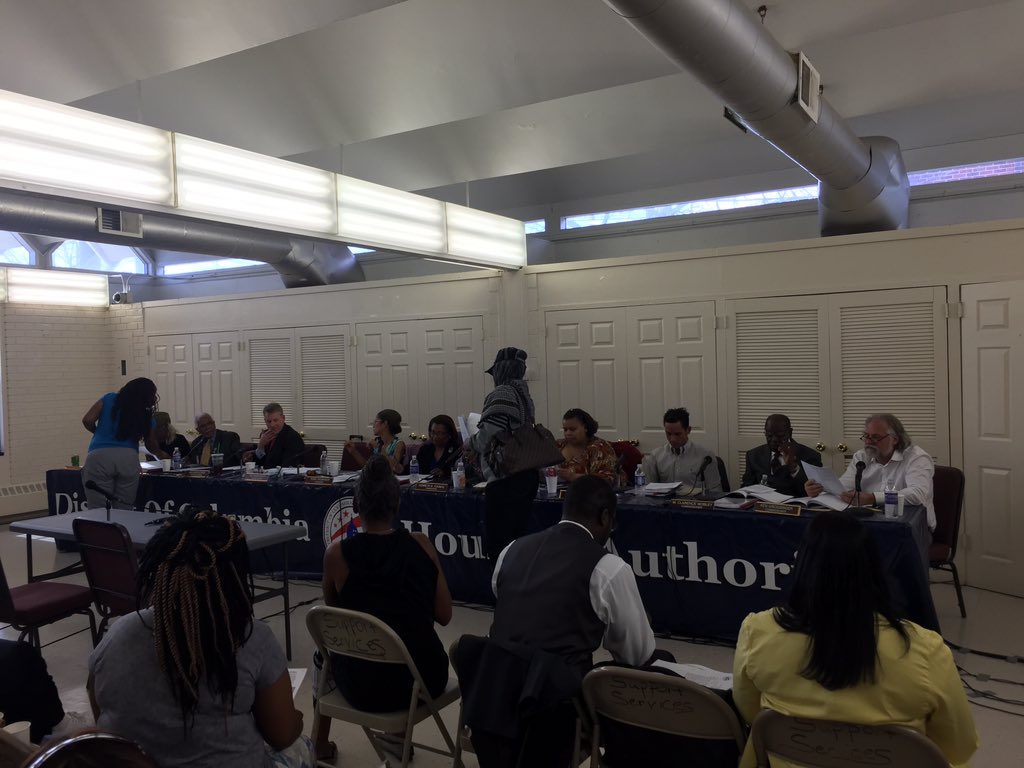On March 9, 2016, the DC Housing Authority (DCHA) Board of Commissioners unanimously passed a resolution advocates are calling the “Right to Return.” The resolution spells out the rights and establishes preferences for current residents of D.C. public housing properties and communities that are undergoing or slated to undergo redevelopment.
The resolution sets the expectation that after redevelopment, former residents who qualify for the right to return will be able to move back into the newly developed mixed-income community and receive the benefits of the community redevelopment.
“It’s not the complete ‘win’ we are looking for yet. It’s definitely a step towards that,” said Sam Jewler, an advocate at Bread for the City who works closely with public housing residents. “The resolution says that, for people currently living in public housing communities, when those communities are redeveloped there will be no new screening requirements including criminal background checks or credit history.”
[Read more: Public housing residents brought their fears to a D.C. Council hearing in January]
The resolution establishes guidelines for the D.C. Housing Authority to follow. However, there is no explicit enforcement mechanism or provisions or legal penalties if the resolution is not followed. “We still need to get regulations written and get it a little more codified, but it’s definitely a good step forward,” Jewler said. “We won’t feel like we have totally [succeeded] until the redevelopment is done, and everyone is back in their homes and it’s been a stable, respectful, and transparent process.”
DCHA’s plan is a formal adoption of part of the DC New Communities Initiative’s (NCI)’s principles for redevelopment. NCI began in 2005 as the city’s response to neighborhood redevelopment in the wake of federal budget cuts to housing revitalization. The NCI is a District government program designed to revitalize distressed subsidized housing and redevelop communities plagued with concentrated poverty, high crime, and economic segregation and replace these units with mixed-income housing. From 2005 to 2008, NCI selected four neighborhoods for participation in its redevelopment plan: Northwest One, Barry Farm, Park Morton, and Lincoln Heights.
NCI has published four principles for redevelopment that are summarized as: “One For One Replacement, Build First, Return and Stay, and Mixed Income.” “One for One Replacement” means that the existing number of bedrooms per unit will be replicated in the new developments and that replacement units will be built within the footprint of the existing neighborhood. “Build First” calls for the development of new housing to begin before demolition of existing distressed housing. “Return and Stay” says that current residents will have priority for returning to replacement housing when it is developed. Mixed-Income” indicates that the city prioritizes creating housing that does not concentrate poverty.
[Read more: Barry Farm residents say they’re gearing up to fight displacment]
While the principles adopted by NCI were intended to minimize the disruptions and hardships generated in previous redevelopment efforts, they have been difficult to implement in practice. The Build First principle requires control of off-site locations and requires the off-site housing to be fully completed prior to the demolition of the on-site housing. This has not happened. While the District’s plans call for replacing affordable housing units “one for one” when housing is redeveloped as mixed-income, only 20 percent of the target replacement units have been achieved to date, or 305 replacement units out of 1542 slated for demolition in the current plans. “Bringing families back is certainly a most important goal, but families have choices and I think you have to be careful about looking at a return rate as a singular sign of success as to whether a redevelopment was done well.” said Adrianne Todman, Executive Director of DCHA. When asked if it is a priority to keep children in their neighborhood schools and families in their community during relocation, Christy Goodman of the DC Housing Authority said, “I don’t think the resolution actually addresses that.”
Tiphanie Williams doesn’t want to move anywhere else. “I want a home, I want a place for my kids to call home.”








